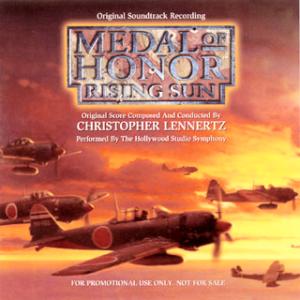Medal of Honor Rising Sun
Music composed by Christopher Lennertz
The composer conducting the Hollywood Studio Symphony
Promotional release only – no catalogue number
Total Playing Time: 61 '00

- Main Titles (3 '15) *
- Taiko Brigade (1 '18)
- PT Attack (1 '08)
- Deep in Guadal Canal (1 '45)
- Stalking the Caves (2 '40)
- We 're Hit! (1 '11)
- Engine Trouble (2 '02)
- Requiem for the California (1 '37)
- Saving Pearl Harbor (2 '05)
- Singapore Docks (2 '04)
- Passing the Nevada (1 '07)
- Burma (3 '08)
- Elephant Battle (1 '12)
- March on the Temple (2 '10)
- A Prisoner 's Eulogy (2 '05)
- Nazi Disguise/ Shima 's Speech (2 '04) *
- Natives Are Restless (1 '50)
- Carrier Deck (1 '15)
- Tanaka 's Death/ The Hanger (3 '36)
- Tank March (1 '23)
- Philippines / Zero Attack (1 '46)
- Courtyard Strike (1 '11)
- Yamashita 's Gold (2 '53)
- Incoming! / Aftermath (1 '37)
- Jungle Swarm (3 '49)
- The Got Donnie (1 '03)
- Shell Shock (2 '20)
- The Sewers (1 '30)
- Shima Express (0 '54)
- Take Off / Finale (1 '50)
- Hymn to Brothers Lost (2 '57) *
* contains themes from previous Medal of Honor releases
Medal of Honor
(1999)
Medal of Honor: Underground (2000)Despite a film-scoring career reaching back to 1994 and a doubtless straight-to-video erotic thriller, Midnight Tease, Christopher Lennertz was named "Best New Composer" of 2002 by Cinemusic.net. Meanwhile the Film Music Review cited his score for Clive Barker 's Saint Sinner among the best of 2002. It would seem Christopher Lennertz time has come, his dues having been paid on various Roger Corman TV remakes of his own Humanoids of the Deep (1996) and Piranha (1999), as well as the acclaimed and rapidly cancelled TV series "Brimstone" (1998).
The original Medal of Honor (1999) game and sequels Underground (2000) and Frontline (2002) were scored by Michael Giacchino, and now Mr Lennertz has stepped into his shoes. The score, currently only issued as a promotional disc, is very much what one would expect from a series which continues to turn the horrors of WWII into home entertainment akin to a Hollywood action blockbuster. Indeed, the original game was originally conceived by Steven Spielberg as a spin-off from Saving Private Ryan (1997). With that in mind the Medal of Honor titles have always had a more cinematic sensibility than most video-games, but whereas SPR attempted to show the grim reality of war, and thus warranted a deglamorised score from John Williams, the games have inevitably leaned towards testosterone driven adventure. Thus the scores have harked back to an earlier generation of war movies, the gung-ho panavision epics of the 1960's, crossed with a little dash of Williams-Spielberg-Indiana Jones style Nazi-thrashing orchestral fireworks.
Medal of Honor Rising Sun is no different. Imagine Where Eagles Dare (1968) scored by John Williams, with a dash of oriental colouring added from Empire of the Sun (1987) for good measure. It's all big, rousing, bright and bold, with full orchestra, occasional wordless choir and appropriate if stereotyped Hollywood ethnic detail – koto, pipa, shakuhachi, wood flutes, erhu, taiko drums and various Japanese percussion. Being a game rather than a film score the music tends to be dominated by succession of short action-suspense set pieces. It all rather blends together after an hour (which is why I haven't singled out particular tracks for comment), and while doubtless highly effective in the game leaves the impression of somehow being a left-over score for some now forgotten big war movie released around 1980. Fine for what it is, and a great calling card for the composer, this in every sense old fashioned score will delight those who simply can not get enough of this particular retro sound, while leaving others wishing for something a little more original and distinctive. For those listeners I might suggest Han Zimmer's more contemporary take on American involvement in Japanese conflict and his score for The Last Samurai (2003).
Gary Dalkin
3
Return to Index